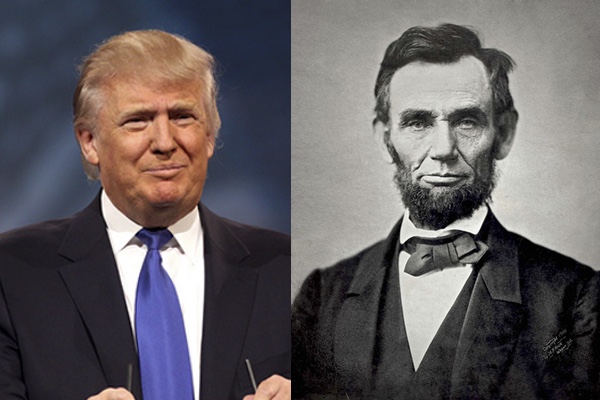How Is Donald Trump Like Lincoln?

UPDATE 1/20/17 In the midst of the activities leading up to Donald Trump's inauguration as the 45th President of the U.S., actor Jon Voight claimed that Lincoln "is smiling knowing America will be saved by an honest and good man who will work for all the people," Given what we know about our 16th President, this seems unlikely. This op-ed from sixteen months ago explains why.
There is a certain irony that Donald Trump is running to be the standard bearer of the party of Abraham Lincoln. Trump is no Lincoln. The two men differ widely in terms of social background, education, political experience, policy positions, and in almost every other way. Trump was born into a family of means; Lincoln told his campaign biographer in 1860 that his early life could be summed up in a single sentence: “The short and simple annals of the poor.” Trump graduated from the prestigious Wharton School of Business at the University of Pennsylvania; Lincoln was largely self-taught, having less than a year of formal schooling in the “three R’s.” Trump has no prior political experience; Lincoln served four terms in the Illinois legislature, sat in Congress, ran for the U.S. Senate, and campaigned widely for Republican candidates in the 1850s. Trump holds to vague, inconsistent, and sometimes contradictory policy positions, even in the midst of his current campaign; Lincoln was remarkably steadfast in his opposition to the expansion of slavery and his adherence to Whig economic principles and platforms over the course of his political career.
Nowhere is this difference more striking than in the campaign style employed by the two men. Trump regularly engages in the art of political insult with his critics and political opponents. He questioned Senator John McCain’s status as a “war hero” because he had been captured and spent five years as a prisoner of war in Vietnam. He castigated Megyn Kelly of Fox News as a “bimbo” for quizzing him about his verbal characterizations of women. He attacked fellow candidates Carly Fiorina for her “looks” and Jeb Bush for his supposed “low energy.” Unlike Trump, the mature Lincoln eschewed political insult. He learned from an early episode in which he engaged in verbal skewering of a political opponent. In the so-called “skinning” of Jesse Thomas during his 1840 campaign for the Illinois legislature, Lincoln mimicked Thomas so effectively on the stump that Thomas broke down in tears. Lincoln subsequently apologized to Thomas and admitted that his behavior “filled him with the deepest chagrin.” He refrained from such conduct after that.
Trump even engages in insulting and denigrating an entire group of people – undocumented immigrants from Mexico. The opening salvo of his campaign characterized most of them as criminals, drug dealers, rapists, and diseased. In his own day, Lincoln found such attacks disgusting. During a period of extreme xenophobia against Irish and German immigrants in the mid-1850s, even as the slavery debate was heating up, Lincoln concluded: “As a nation, we began by declaring that ‘all men are created equal.’ We now practically read it ‘all men are created equal, except negroes.’ When the [anti-immigrant] Know-Nothings get control, it will read ‘all men are created equal, except negroes, and foreigners and catholics.’ When it comes to this I should prefer emigrating to some country where they make no pretense of loving liberty. . . .”
Instead of using braggadocio and political insult, which are Trump’s stock in trade, Lincoln often used self-deprecating humor to disarm opponents and move audiences. In the midst of the famous Lincoln-Douglas debates during the campaign for the U.S. Senate in Illinois in 1858, this was on full display. When Stephen Douglas, his opponent, accused Lincoln of being two-faced, he responded not with counter-insult but by drawing on his own perceived homeliness: “Honestly, if I were two-faced, would I be showing you this one?” The audience laughed, leaving Douglas with no retort. This incident typified Lincoln’s campaign style.
In an era of dysfunction and partisanship in politics, some Americans justify their attraction to Trump and excuse his behavior by saying that an arrogant and aggressive political outsider is needed. In a time of far greater dysfunction and partisanship – the Civil War era was, after all, the time when the so-called “blundering generation” led us into a military conflict that left 750,000 dead – Lincoln, a skilled and principled political insider, guided us steadily through the crisis, never allowing his fellow Americans to lose track of our founding principles. I can only hope that we find our Lincoln in the current context. Let me paraphrase a remark by the late Senator Lloyd Bentsen: I have studied Lincoln’s life and career extensively. I teach a course on Lincoln. You, Mr. Trump, are no Lincoln.